Feature: Mobility goes to stock market
Stock traders and institutional investors are carefully watching the Uber IPO and Lyft stock activity since its recent launch. While the two companies are credited with upending the ride-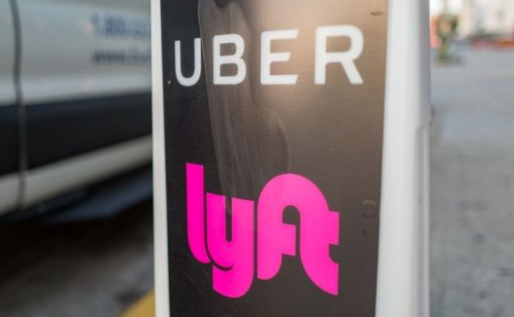 hailing industry, the big question will be: Should you buy the stock?
hailing industry, the big question will be: Should you buy the stock?
Uber’s initial public offering on Thursday reported that the company lost $1.8 billion last year, excluding certain transactions, on revenue of $11.3 billion. The prospectus also revealed that revenue growth has been slowing down.
Will Uber reach its hoped-for market valuation of $100 billion? Arch-competitor Lyft was valued at $24 billion last month as its IPO came together. Uber is much larger in transactions and revenue size, but it likely won’t reach that level of value. Silicon Valley neighbors Amazon, Apple, and Alphabet are hoping to hit $1 trillion sometimes soon, but that’s come after quite a few years of profitable growth and billions of customers; and having multiple lines of products and services, far beyond anything Uber and Lyft are likely to get into.
Tesla is valued around $46 billion now and General Motors is at about $56 billion. The love affair with Tesla has waned as stockholders want to see mass production Model 3s hit their scheduled target and profits increase during a time that the electric carmaker has seen several high-level management turnovers. Still, many shareholders continue to back Tesla as it prepares to launch the Model Y and autonomous functionality.
CEO Elon Musk may be in more hot water on the regulatory side with a Twitter comment made yesterday on the company producing 500,000 vehicles over the next year. Musk posted a similar tweet almost two months ago, where he said the company would build half a million units in 2019. That led the U.S. Securities and Exchange Commission to argue Musk was in contempt of a settlement they’d reached last year. In an earlier interview, Warren Buffett, CEO of Berkshire Hathaway (which has an astronomically high stock price of $314,250 per share today and a market cap at $515.25 billion), encouraged Musk to be more careful about what he writes on Twitter.
Lyft started last week at $74.45 per share, much better than its March 28 IPO price of $72. The week ended on a sour note by closing Friday at $59.90, its lowest price ever. That meant about $3 billion in dropped market capitalization to $17.1 billion.
There’s still a lot of talk about room-sharing giant Airbnb going public this year, along with Chinese ride-hailing firm Didi Chuxing. Companies looking for global growth must have capital in high volume to pay for the technology, personnel, independent contractors, marketing, and systems development required to reach that level. Stock market trading can be a necessity when angel investors and venture capital firms can’t provide the cashflow needed to hit that profitable growth mark.
Launching an IPO, keeping stock value consistent, and providing detailed, honest financial reports are a tough call for these mobile app service providers. Uber and Lyft do benefit from strong brand identity and growing market reach. It’s rare to meet someone these days who’s never used their services; and customers do enjoy the cost, convenience, quickness, and avoiding the stress of traffic and finding parking.
Feature: Are electric scooters going to make it?
Renting a small electric scooter from startups Lime and Bird is becoming pervasive in cities across the country. For $1, and about 29 cents per minute, you can easily get from Point A to Point B and avoid the hassles of finding parking, waiting for the bus, paying for an Uber or Lyft ride, etc. But how viable are these and other scooter companies going to be in the next few years?
It’s a hard industry to make money in with the cost of charging, the lifetime of the battery, repair costs, the depreciation of the bikes, and the impact of vandalism and theft. Bird and Skip have spoken more publicly about the rough reality of thriving in the sector.
Ofo, a China-based bikesharing platform has entered bankruptcy, according to report. Ofo later denied reports of impending bankruptcy and maintained that the company is doing just fine. News came out in March that Meituan Dianping, which owns Ofo-rival Mobike, will scale back its operations following losses.
Then there’s the question of safety. Only three e-scooter deaths had yet been reported as of late January, which is likely to increase as ridership grows in leaps and bounds.
A recent study by UCLA published in medical journal JAMA Network Open found that only 4.4% of e-scooter accidents in the Los Angeles area included riders wearing helmets. With an estimated 65,000 e-scooters on American streets and concerns over their safety has led to talks of banning the bikes unless safety guidelines are implemented.
News Briefs:
ACT Expo is coming up next week (April 23-26), and the full speaker roster has been released for the ninth annual show taking place at the Long Beach Convention Center in Southern California. Along with it, over a dozen co-located events have been announced, held in partnership with leading industry organizations and member-based associations across the commercial transportation space. Fleet Owner and ACT Expo are partnering on one of them, offering a new workshop for operations and maintenance professionals. Called “Workforce Development: Meeting the Vehicle Maintenance Challenge,” the day-long workshop on Tuesday, April 23 brings together a strong team of maintenance, operations, technology and training experts to take on some of the toughest issues facing maintenance providers.
GM backing away from Rivian: Talks between General Motors and electric truck startup Rivian Automotive about the automaker taking an equity stake may be dead, people familiar with the matter said. Amazon.com Inc. has been supporting the startup EV maker that led to a $700 million equity fund raised in February. Plymouth, Mass.-based Rivian plans to bring all-electric trucks and SUVs to market. GM will likely be continuing to develop its own electric pickup, which is still in the early phase of development.
Audi campaign: “Electric has gone Audi,” according to new billboard ads. Audi’s new marketing campaign is attempting to debunk perceptions about electric vehicles that have kept them from breaking into high-volume sales, including fears about range, charging infrastructure, and performance. For now, Audi is telling the story about its new e-tron electric SUV, which is the first of three all-electric vehicles that the Volkswagen division will be launching over three years. The first TV spot, called “Not For You,” starts by showing a man in his bathrobe gazing at this neighbor’s e-tron. He’s transported into a number of scenarios attempting to debunk the myths about range anxiety and other misconceptions.
SoftBank might be the most significant company of all of them to watch for those interested in smart mobility. The Japanese multinational holding conglomerate owns the sixth-largest phone company in the world and many other divisions. Softbank is betting about $60 billion in more than 40 companies in ride-hailing, car-sharing, delivery robots, and self-driving vehicles, according to chief Masayoshi Son. More than $13 billion of it will be going into the publicly trading Uber Technologies Inc.
Tesla has rolled out a leasing program for its Model 3 electric sedan for the first time while also making it harder to buy the $35,000 base version of the vehicle. The company said on Thursday that it would begin leasing the Model 3 “for a small down payment and competitive monthly payments.” But it won’t end the way the usual lease does. “Please note, customers who choose leasing over owning will not have the option to purchase their car at the end of the lease, because with full autonomy coming in the future via an over-the-air software update, we plan to use those vehicles in the Tesla ride-hailing network,” Tesla said in a blog post.
Hyundai generates power from hydrogen: Hyundai Motor Company signed a memorandum of understanding (MOU) with South Korean local energy firms Korea East-West Power (EWP) and Deokyang to generate electricity from hydrogen. The pilot project will deliver a 1 megawatt (MW) hydrogen fuel cell power facility, with Hyundai Motor building the fuel cell system, EWP managing the facility and sale of electricity, and Deokyang supplying the hydrogen. The system will be powered by multiple power models from Hyundai’s Next fuel cell vehicle. The facility can generate an annual supply of 8,000 MWh, enough electricity to power approximately 2,200 households at 300 kWh per month, while emitting zero greenhouse gases or pollution since it is fueled by hydrogen.
 148,704 plug-in vehicles were sold in the U.S. during the first half of 2019, compared to 124,256 for first half of 2019. That makes for an increase of 19.67 percent over that same period last year of plug-in hybrid and battery electric vehicles. Through May, there were 840,814 in global plug-in vehicle sales, versus 591,796 for the first five months of 2018 — an increase of 42 percent over that same period last year.
148,704 plug-in vehicles were sold in the U.S. during the first half of 2019, compared to 124,256 for first half of 2019. That makes for an increase of 19.67 percent over that same period last year of plug-in hybrid and battery electric vehicles. Through May, there were 840,814 in global plug-in vehicle sales, versus 591,796 for the first five months of 2018 — an increase of 42 percent over that same period last year.
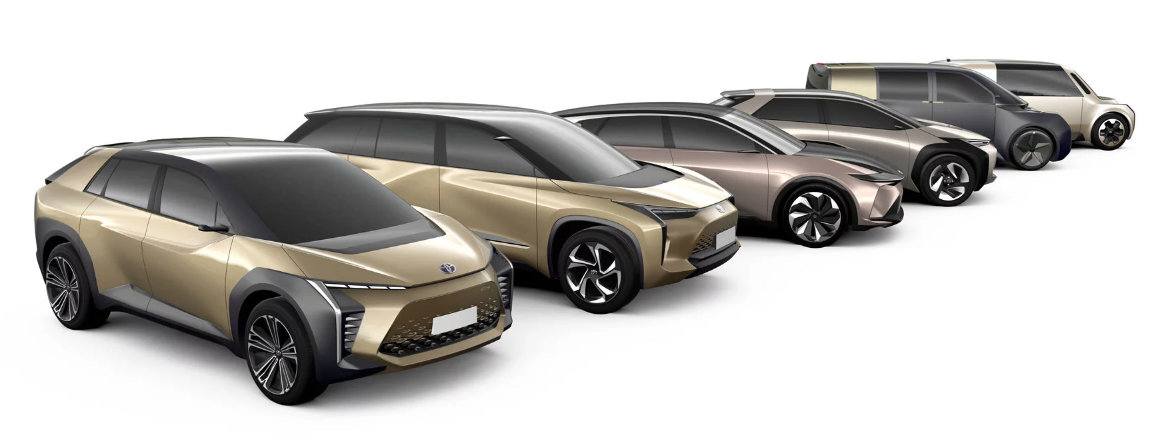 The new electric vehicles, with the working name of EV-e, will have long wheelbases, plenty of interior space, camera mirrors, and ventilated front corners with automated driving sensors. The company is showing off life-sized clay concepts to tell the story. They represent a lineup that Toyota designers have been working on since 2016, based on the Toyota New Global Architecture (e-TNGA) modular platform
The new electric vehicles, with the working name of EV-e, will have long wheelbases, plenty of interior space, camera mirrors, and ventilated front corners with automated driving sensors. The company is showing off life-sized clay concepts to tell the story. They represent a lineup that Toyota designers have been working on since 2016, based on the Toyota New Global Architecture (e-TNGA) modular platform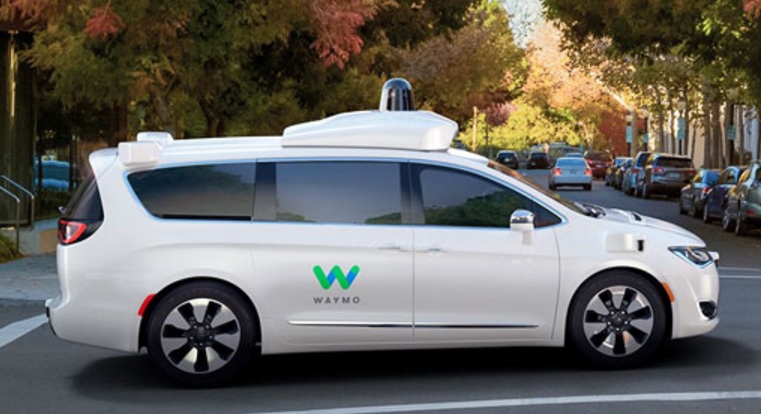 and Fiat Chrysler Automobiles, making moves in this direction. Autonomous vehicle leader Waymo is
and Fiat Chrysler Automobiles, making moves in this direction. Autonomous vehicle leader Waymo is  hailing industry, the big question will be:
hailing industry, the big question will be: 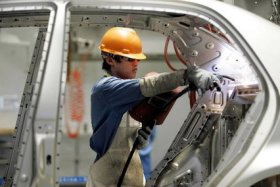 coming close to a record high in the U.S. (which surprised market analysts), that may be a temporary blip. Foreign automakers have 19 assembly plants in the U.S., but General Motors is closing four American plants and Ford is going through a major reorganization. Even so, U.S. auto plants have the capacity to make three million more cars that they can sell. Analysts think that this year’s strong sales come from higher fleet sales, lower unemployment, and Tesla’s rapid production ramp up. Shareholders are putting a great deal of pressure on automakers to lead the way in new products, advanced vehicle technology, and strong profit margins. Automakers have been taking big steps to change over their product lineups (less cars, more trucks and SUVs) and prepare for launching mobility services and a higher volume of electric vehicles. Here’s a look at some of the major events that have been shaping market dynamics in the U.S. and global automotive landscape — and its impact on green vehicle sales and adoption of new technology and mobility………….
coming close to a record high in the U.S. (which surprised market analysts), that may be a temporary blip. Foreign automakers have 19 assembly plants in the U.S., but General Motors is closing four American plants and Ford is going through a major reorganization. Even so, U.S. auto plants have the capacity to make three million more cars that they can sell. Analysts think that this year’s strong sales come from higher fleet sales, lower unemployment, and Tesla’s rapid production ramp up. Shareholders are putting a great deal of pressure on automakers to lead the way in new products, advanced vehicle technology, and strong profit margins. Automakers have been taking big steps to change over their product lineups (less cars, more trucks and SUVs) and prepare for launching mobility services and a higher volume of electric vehicles. Here’s a look at some of the major events that have been shaping market dynamics in the U.S. and global automotive landscape — and its impact on green vehicle sales and adoption of new technology and mobility…………. new
new 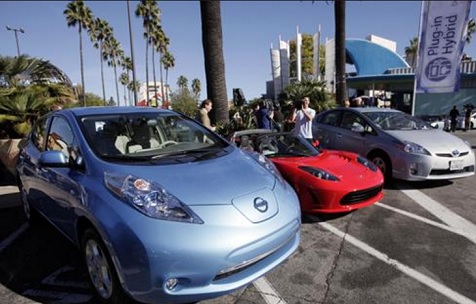 and emissions standards. On Dec. 15, William Wehrum, head of the Environmental Protection Agency’s Office of Air and Radiation, National Highway Traffic Safety Administration deputy chief Heidi King, and Mike Catanzaro, a senior White House aide, discussed goals with CARB officials on maintaining one set of national requirements for automakers in the cars they sell, according to Automotive News. Automakers have been asking the Trump administration to be lenient on fuel economy standards based on the realities of new vehicles being sold with gasoline prices staying low and consumers being more interested in trucks and SUVs. California has taken a more independent, stringent tactic on its zero emissions rules. “We’ve had productive conversations under way with CARB and I would hope those conversations continue to be productive,” Wehrum said. “I think a shared goal is to maintain one national program.”
and emissions standards. On Dec. 15, William Wehrum, head of the Environmental Protection Agency’s Office of Air and Radiation, National Highway Traffic Safety Administration deputy chief Heidi King, and Mike Catanzaro, a senior White House aide, discussed goals with CARB officials on maintaining one set of national requirements for automakers in the cars they sell, according to Automotive News. Automakers have been asking the Trump administration to be lenient on fuel economy standards based on the realities of new vehicles being sold with gasoline prices staying low and consumers being more interested in trucks and SUVs. California has taken a more independent, stringent tactic on its zero emissions rules. “We’ve had productive conversations under way with CARB and I would hope those conversations continue to be productive,” Wehrum said. “I think a shared goal is to maintain one national program.”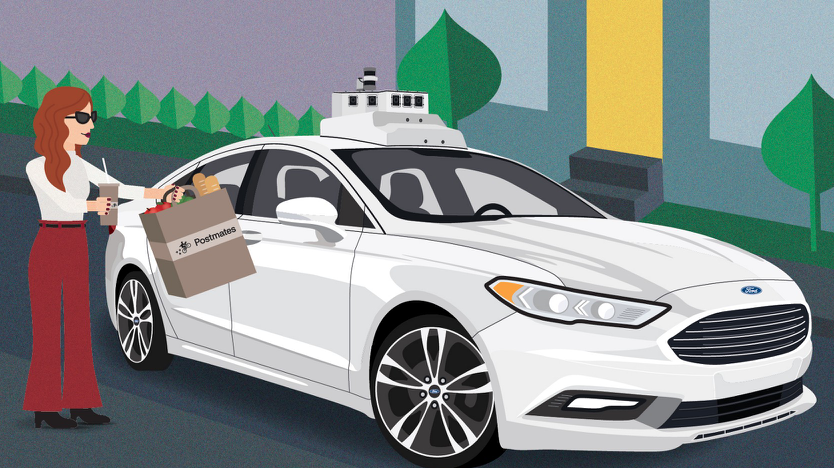 d Motor Co.
d Motor Co.  ahead of the 2018 Consumer Electronics Show (CES) in Las Vegas. Aurora Innovation also signed a deal with Hyundai this week, similar to its alliance with VW, to bring its self-driving software into commercial use. Based in Palo Alto, Calif., and Pittsburgh, Penn., Aurora designs and builds self-driving technology, partnering with automakers to integrate, pilot and deploy advanced self-driving platforms into vehicles. Founded by CEO Chris Urmson, Chief Product Officer Sterling Anderson and Chief Technical Officer Drew Bagnell, Aurora is working to solve today’s most complex AI, automation and engineering challenges to improve transportation and positively impact cities. Urmson had played a leading role at Google’s self-driving car unit, before it became Waymo.
ahead of the 2018 Consumer Electronics Show (CES) in Las Vegas. Aurora Innovation also signed a deal with Hyundai this week, similar to its alliance with VW, to bring its self-driving software into commercial use. Based in Palo Alto, Calif., and Pittsburgh, Penn., Aurora designs and builds self-driving technology, partnering with automakers to integrate, pilot and deploy advanced self-driving platforms into vehicles. Founded by CEO Chris Urmson, Chief Product Officer Sterling Anderson and Chief Technical Officer Drew Bagnell, Aurora is working to solve today’s most complex AI, automation and engineering challenges to improve transportation and positively impact cities. Urmson had played a leading role at Google’s self-driving car unit, before it became Waymo.